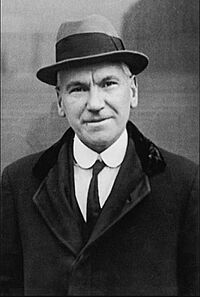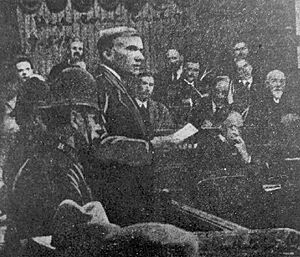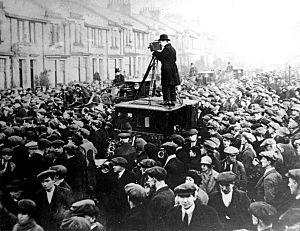John Maclean (Scottish socialist) facts for kids
Quick facts for kids
John Maclean
|
|
|---|---|

John Maclean in December of 1918 upon his release from prison
|
|
| Bolshevik consul in Scotland | |
| In office February 1918 – Unknown |
|
| Vice-President (Honorary) of the Third All-Russian Congress of Soviets | |
| In office 23 January 1918 – 31 January 1918 |
|
| Personal details | |
| Born | 24 August 1879 Pollokshaws, Scotland |
| Died | 30 November 1923 (aged 44) Pollokshaws, Glasgow, Scotland |
| Resting place | Eastwood New Cemetery |
| Citizenship | British |
| Political party | Scottish Workers Republican Party |
| Other political affiliations |
Communist Labour Party Socialist Labour Party SDF (later BSP) Co-op movement |
| Spouse | Agnes Maclean |
| Alma mater | University of Glasgow |
| Profession | Schoolteacher, Politician |
John Maclean (born 24 August 1879 – died 30 November 1923) was a Scottish schoolteacher and a strong supporter of social change. He lived during a time known as Red Clydeside, when many workers in Glasgow fought for better rights.
Maclean was very vocal against World War I. Because of his views, he was arrested under a law called the Defence of the Realm Act. He also lost his job as a teacher. After this, he became a full-time speaker and organizer, teaching people about Marxism, a way of thinking about society and economics.
In April 1918, he was arrested again for sedition, which means encouraging people to rebel against the government. He gave a famous 75-minute speech during his trial. This speech became very important for left-wing groups in Scotland. He was sentenced to five years in prison, but he was released after the war ended in November 1918.
Maclean believed that Scottish workers were especially ready to lead a revolution. He even talked about "Celtic communism", which he thought was inspired by the old Scottish clan spirit. He tried to start a Scottish Workers Republican Party and a Scottish Communist Party, but these groups were not very successful.
He was chosen as a representative for the Bolsheviks (a revolutionary group in Russia) in Scotland. However, he didn't agree with the main Communist Party of Great Britain. While in prison, Maclean went on a hunger strike. This seriously affected his health. He later collapsed during a speech and died from pneumonia when he was 44 years old.
Contents
Biography
Early Life and Education
John Maclean was born in Pollokshaws, a town near Glasgow, Scotland. His father, Daniel, was a potter, and his mother, Ann, came from Corpach. His parents spoke Gaelic, and he grew up in a strict Calvinist family.
Maclean trained to be a schoolteacher with the help of the Free Church. He also took classes part-time at the University of Glasgow. He earned a Master of Arts degree in 1904. He often used "M.A." after his name when his writings were published.
Becoming a Political Activist
Maclean first became interested in politics through a local group called the Pollokshaws Progressive Union. He was also influenced by a book called Merrie England by Robert Blatchford.
He became convinced that the lives of working-class people could only get better through a big social change. He joined the Social Democratic Federation (SDF) as a Marxist. This group later became the British Socialist Party.
In 1906, Maclean gave many speeches in Pollokshaws. These speeches led to the creation of an SDF branch there. He met James D. MacDougall through these events, who became his strongest supporter.
Maclean was also active in the Co-operative movement, which helps people work together to buy and sell goods. Because of his important role, co-operative groups in Renfrewshire pushed local school boards to offer economics classes for adults.
Maclean strongly disagreed with the leaders of the British Socialist Party about World War I. He saw the war as an "imperialist war," meaning it was fought for control and power, not for the good of ordinary people.
Teaching Marxism
By the time of World War I, John Maclean believed in revolutionary socialism. This meant he wanted big, fast changes in society. He worked with others, like his friend James Maxton, who wanted more gradual changes.
Maclean was very against the war. He believed it was a war of imperialism that made workers fight each other. He explained his views in a letter to Forward.
The authorities knew about his political views. On 27 October 1915, he was arrested under the Defence of the Realm Act. The Govan School Board also fired him from his teaching job at Lorne Street Primary School. After this, he became a full-time speaker and organizer, teaching workers about Marxist ideas. He later started the Scottish Labour College.
During World War I, he was active in groups that opposed the war. He was imprisoned in 1916 for breaking the Defense of the Realm Act. However, he was released in 1917 after protests following the February Revolution in Russia.
Connection with Russia
In January 1918, Maclean was chosen to lead the Third All-Russian Congress of Soviets, a big meeting in Russia. A month later, he was named the Bolshevik representative (like a consul) in Scotland. He set up an office in Glasgow, but the British Government refused to officially recognize him.
Trial and Imprisonment (1918)
On 15 April 1918, John Maclean was arrested for sedition. This means he was accused of encouraging people to rebel against the government. He was not allowed bail, and his trial was set for 9 May in Edinburgh.
Maclean defended himself in court. He refused to plead guilty or not guilty. When asked if he had any objections to the jury members, he replied, "I object to the whole lot of them." The case against him was based on what witnesses remembered him saying in his speeches. Maclean argued that his words were taken out of context. He said, "The main parts of my speech, in which my themes are developed are omitted. I want to expose the trickery of the British government and their police and their lawyers."
His speech from the dock became very famous among Scottish left-wing groups. It lasted about 75 minutes. Maclean's speech began:
It has been said that they cannot fathom my motive. For the full period of my active life I have been a teacher of economics to the working classes, and my contention has always been that capitalism is rotten to its foundations, and must give place to a new society. I had a lecture, the principal heading of which was "Thou shalt not steal; thou shalt not kill", and I pointed out that as a consequence of the robbery that goes on in all civilised countries today, our respective countries have had to keep armies, and that inevitably our armies must clash together. On that and on other grounds, I consider capitalism the most infamous, bloody and evil system that mankind has ever witnessed. My language is regarded as extravagant language, but the events of the past four years have proved my contention.
He continued:
I wish no harm to any human being, but I, as one man, am going to exercise my freedom of speech. No human being on the face of the earth, no government is going to take from me my right to speak, my right to protest against wrong, my right to do everything that is for the benefit of mankind. I am not here, then, as the accused; I am here as the accuser of capitalism dripping with blood from head to foot.
He finished his speech by saying:
I have taken up unconstitutional action at this time because of the abnormal circumstances and because precedent has been given by the British government. I am a socialist, and have been fighting and will fight for an absolute reconstruction of society for the benefit of all. I am proud of my conduct. I have squared my conduct with my intellect, and if everyone had done so this war would not have taken place. I act square and clean for my principles. .... No matter what your accusations against me may be, no matter what reservations you keep at the back of your head, my appeal is to the working class. I appeal exclusively to them because they and they only can bring about the time when the whole world will be in one brotherhood, on a sound economic foundation. That, and that alone, can be the means of bringing about a re-organisation of society. That can only be obtained when the people of the world get the world, and retain the world.
He was sentenced to five years in Peterhead prison. However, many people campaigned for his release. They pointed out that other political prisoners in Germany had been freed. They also highlighted that Maclean was being force-fed in prison, which was very harsh.
After the war ended on 11 November, he was released on 3 December 1918. He returned to Glasgow and received a huge welcome. Eleven days later, Maclean ran as a candidate for the Labour Party in the general election for Glasgow Gorbals. He did not win the seat.
Views on Ireland
Maclean supported the idea of Home Rule for Ireland, which meant Ireland would govern itself. At first, he was worried about a fully independent Ireland. However, he later became committed to Irish independence as part of a worldwide fight against imperialism. He wrote a pamphlet called 'The Irish Tragedy: Scotland's Disgrace', which sold 20,000 copies.
He visited Dublin in July 1919 and gave speeches there. By the end of his life, his views on Ireland had become stronger. He supported Ireland's fight for freedom, seeing it as helping the revolution in Russia. He believed that Irish independence would also benefit Scotland by creating more opportunities for Scottish workers.
Starting the Communist Party
The British Socialist Party, which Maclean belonged to, joined to form the new Communist Party of Great Britain. However, Maclean felt disconnected from this new party, even though he supported the Communist International (a worldwide organization of communist parties).
He wanted Glasgow to become like Petrograd (a revolutionary city in Russia). But he strongly believed that Moscow should not tell Glasgow what to do. He supported the idea of a Scottish Workers' Republic. He thought that workers in Scotland could become revolutionary faster than those in England and Wales.
In 1920, he tried to start a Scottish Communist Party. This group later changed its name to the Communist Labour Party and dropped some of Maclean's unique ideas. So, he left the group. He tried again to start a new Scottish Communist Party, but it wasn't successful. He may have joined the Socialist Labour Party around this time.
In November 1922, he wrote that "the British empire is the greatest menace to the human race." He believed that breaking up the British Empire would be best for humanity. He argued that the Irish and Indians were playing their part, and Scots should too. He felt that the English communists and ruling class justified the need for a Scottish Communist Republic.
In 1923, Maclean started the Scottish Workers Republican Party. This party combined communist ideas with Scottish nationalism. Maclean's call for a Communist Republic of Scotland was based on his belief that traditional Scottish Gaelic society, with its clan system, was organized like a community. He argued for "the communism of the clans must be re-established on a modern basis" and used the slogan "back to community and forward to communism."
See also
 | Frances Mary Albrier |
 | Whitney Young |
 | Muhammad Ali |



